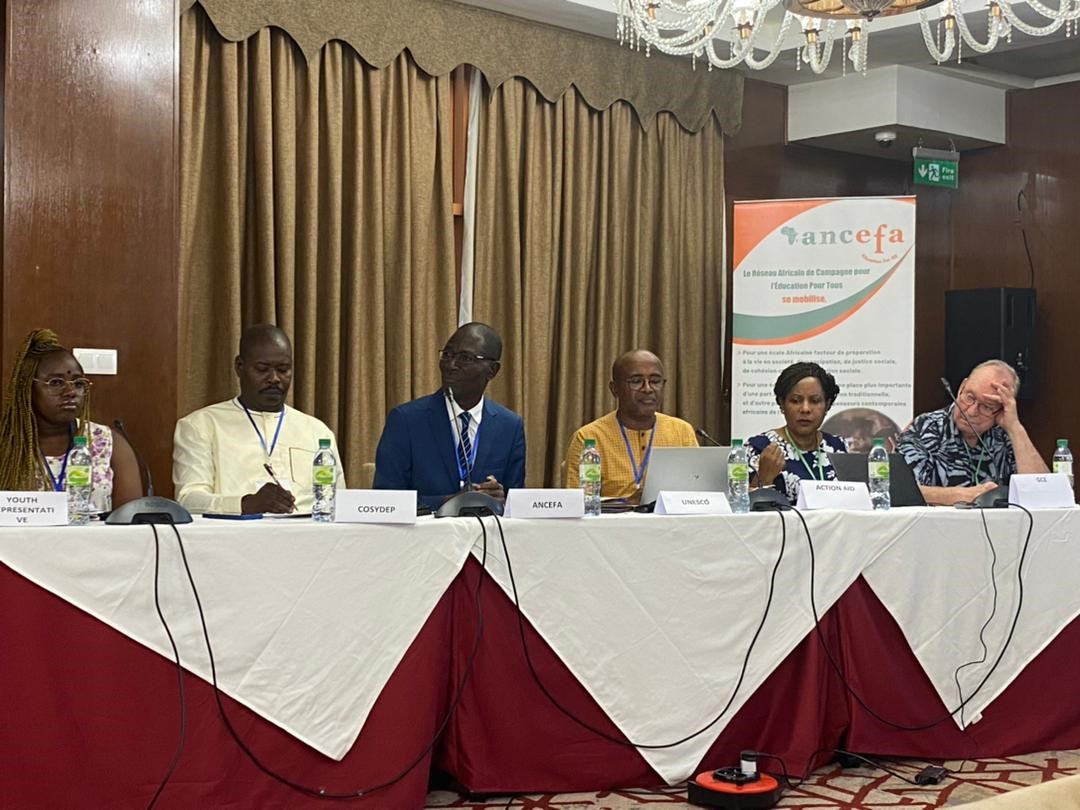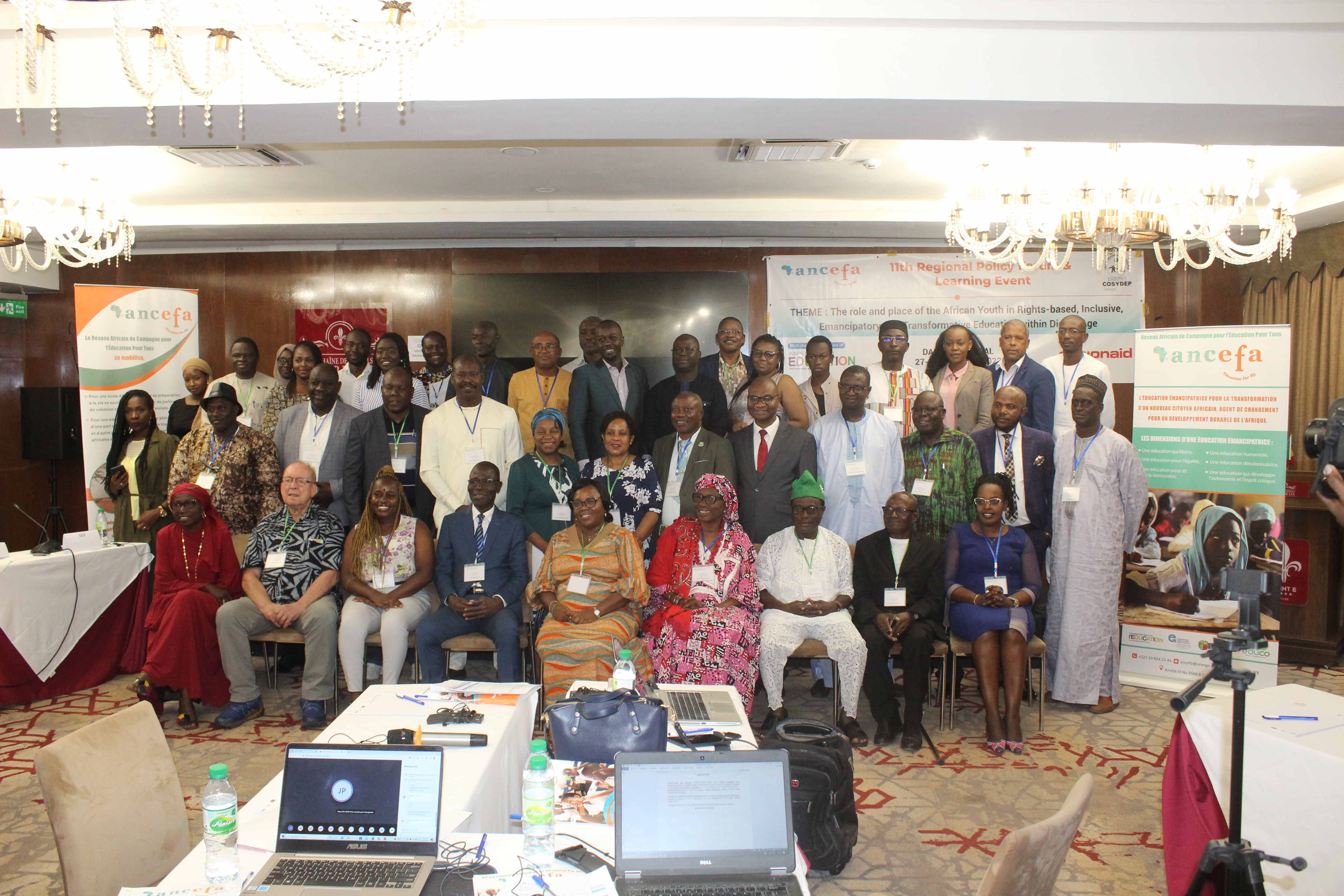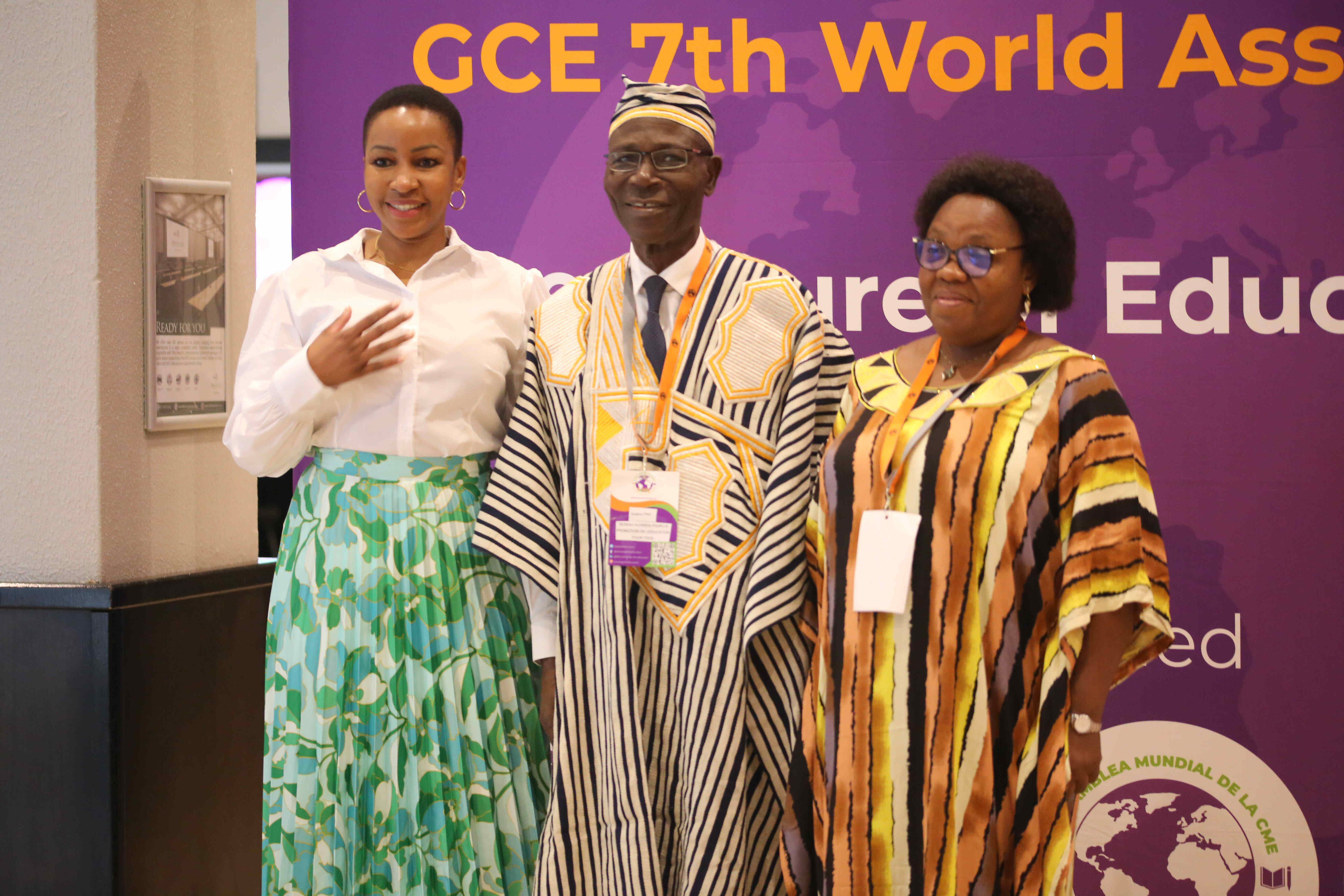ANCEFA's Events and Action, October - November 2022

The 11th PanAfrican Education Policy Forum
The period of October – December 2022 has witnessed monumental leaps in the history of ANCEFA policy advocacy and strategic engagement in pursuit of inclusive quality Education for all. The main goal remained the overarching one of working towards ensuring that Education and training systems in Africa are transformed and adequately funded to sustain inclusive equitable quality Education and lifelong learning opportunities for all at all levels.
The 11th PanAfrican Education Policy Forum held in Dakar – SENEGAL on 27 – 28 October 2022, organised by ANCEFA in collaboration with the Global Campaign for Education (GCE), ActionAid International and Coalition des Organisations en Synergie pour la Défense de l'Education Publique (COSYDEP) with some 70 delegates attending in person and some others online. The Forum theme was "The role and place of the African Youth in Rights-based, Inclusive, Emancipatory and Transformative Education within Digital Age". Delegates included representatives of the ANCEFA member National Education Coalitions (NECs), members of the academia, youth activists from Senegal, and regional networks and partners such as GCE, Forum for African Women Educationalists (FAWE), Action Aid, ACEA, ASPBAE, UNESCO and UNICEF.
Forum provided space for reflections and generation of lessons on the status of Education in Africa based on objectives outlined in Sustainable Development Goals (SDG) 4 and 5, UNESCO Education 2030 Framework, and the African Union (AU) Agenda 2063 and Continental Education Strategy for Africa (CESA) 16-25. Regarding the youth, delegates developed a revamped plan of action for sustained youth participation and effective policy engagement. Delegates reaffirmed that Education is a fundamental human right and emphasised that the transformation of education must be a social pact with ANCEFA as the driving force in Africa. According to the delegates, education must be transformed to make it an engine of equality because the main thing is not to learn a lot but to learn how to learn. While reflecting on the status of education in Africa delegates noted with great concern that despite efforts by African governments to improve access and quality of education, major challenges remained. They noted that 98 million children were out of school, and that there was an acute shortage of teachers estimated at 17 million in Africa alone, gap needed to be filled in order to meet the SDG4 by 2030. They pinpointed specific challenges relating to improving the quality of education and keeping girls and children with disabilities in school. They also noted challenges in early childhood care and education; recruiting and motivating teachers who form the backbone of our education systems; the construction of quality school infrastructure; digitisation of the curriculum; and the implementation of education in emergency situations. Furthermore, they noted that there was a huge global education funding gap which was most likely to increase by US$30 billion to US$45 billion, with a huge chunk of it in Africa according to UNESCO. Concerning the youth, delegates were saddened to note that most of the youth were frustrated because of lack of access to skills training, jobs, and employment opportunities. They also noted that in most countries youth participation in development activities left a lot to be desired. They expressed the need to revisit the youth engagement strategy in policy discussion spaces. After the deliberations, delegates made the following calls to action-
- That African governments must ensure that young people are at the center of any efforts to transform education and that youth, more especially the marginalized youths, are allowed to participate actively in all education and skills development processes.
- That African governments must review their education policies, strategies, and curriculum to ensure that education philosophy is rethought with a view to embracing the current paradigms. The paradigms oblige the recognition that the learner must be a major player in his own construction, and that stakeholders led by governments must provide products that are capable of transforming their situation, their community, and their nation.
- That African governments must support the safe school agenda in word and deed, to forestall the myriad of disasters, emergencies, and pandemics that continue to attack education systems with grave consequences on teachers, learners, and infrastructure.
- That African governments, and more especially, Education and Line Ministries must harness political will and accountability towards fulfilling policy commitments on education and youth development agenda, through proper planning, appropriate budgeting and timely implementation.
- That African governments must address the education funding gap by increasing the education budget and keeping the commitment of allocating not less than 6% of the GDP and/or 20% of the national budget to education.
- That African governments must support innovation and learning and ensure the adoption of practical and tested processes that have the potential for replication, sustainability and scalability on a wide scale.
- That ANCEFA and its member NECs and interested stakeholders should sustain the push to strengthen youth engagement in the development of their learning paths that respond to narrowing the intergenerational gap within society.
- That ANCEFA and its member NECs must focus on tracking education financing and hold governments to account for their education financing commitments.
- That ANCEFA and its members NECs must track African states’ commitments towards human rights treaties, conventions and accords to ensure that the right to education is protected, defended, and accessed by all children and youth.

AU Innovating Education in Africa 2022
The Commissioner in charge of Education Science Technology and Innovation (ESTI) of the Africa Union Commission asked ANCEFA to join a Technical Panel of 12 experts to review submissions made on innovating Education in Africa, the 2022 cohort.
The Africa Union Innovating Education in Africa - curating Education innovators on new and practical education innovations with the potential for sustainability, scalability and replication on a wide scale. The process also entail rethinking solutions and ideas for Education and skills development, especially as countries emerge from COVID-19.
In order to achieve its objectives, call for application had been made and AUC intended to incentivize innovation by selected the final three innovations from the hundreds of submissions received.
It was also expected to spur promotion of innovation partnerships involving education and training institutions, governments and other key stakeholders.
ANCEFA participated in the review and selection processes (virtual) but was unable to attend and participate in the TVET Innovation Conference held on 9 – 11 November, high-profiling emerging Education and training practices (Tunis, Tunisia) where the final selection of 3 was to be done.

Global Campaign for Education World Assembly 22-24 November in Johannesburg, South Africa
ANCEFA Board representatives, members and Regional Coordinator participated actively in the GCE World Assembly held from 22 to 24 November in Johannesburg which brought together GCE members and partners across the globe. The World Assembly debated emerging issues, clarified collective positions and offered a platform for leaning and exchanging on on the ground advocacy and campaign experiences from its networks, including the vibrant youth movement. The World Assembly also provided strategic priorities and direction for the four years to come.
Prior to the World Assembly, ANCEFA Board organised several consultations to discuss the agenda, strategic priorities and arrive to a consensual position on representation of the Africa movement in the GCE Board. ANCEFA nominated two new representatives to the GCE Board, namely the ANCEFA Board Chair, Mr. Paul Gnelou and Ms. Faraja Kotta Nyalandu, the Chair of TEN MET the Tanzania Education Coalition Board chair to represent them on the GCE Board for the next four years.
We wish them well as they engage in the new GCE Board whose president, Mr Refaat Sabbah was reelected by the World Assembly. It was also the opportunity to thank our outgoing members on the GCE Board, Mr Samuel Dembele and Illiass Alhousseini for their excellent representation.


